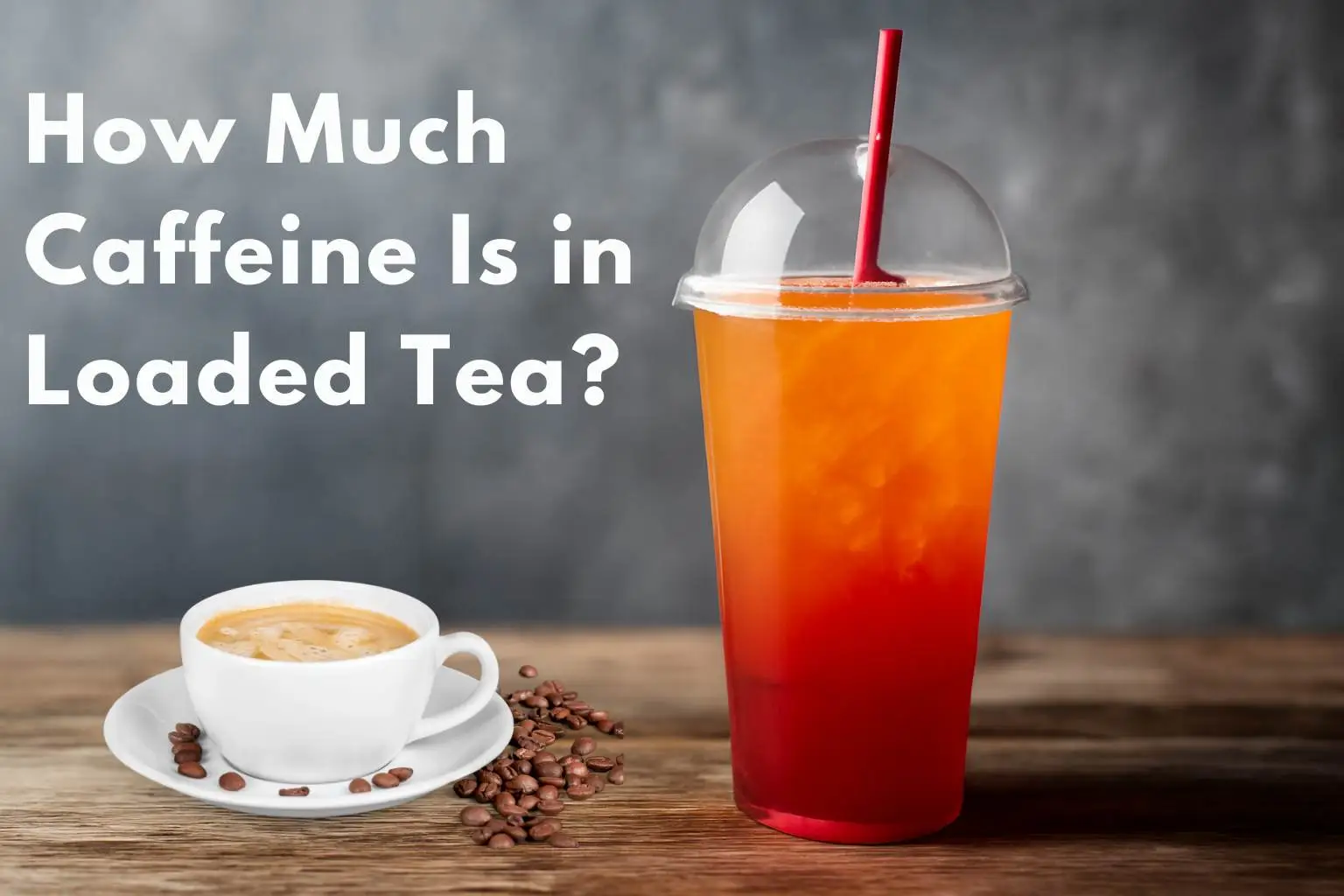If you’ve scrolled through social media lately, you’ve probably seen those vibrant, Instagram-worthy beverages called loaded teas taking the internet by storm. With their rainbow colors and playful names like “Unicorn” and “Gummi Bear,” these energy-boosting drinks.
Herbal tea beverages and nutritional supplements promise sustained energy, weight loss benefits, metabolism boost, and a healthier alternative to traditional energy drinks and pre-workout supplements. But here’s the question many health-conscious consumers, fitness enthusiasts, and caffeine-sensitive individuals are asking: how much caffeine is in a loaded tea?
The answer might surprise you. Most loaded teas contain between 100mg to 391mg of caffeine per serving – that’s significantly more than a cup of coffee and can rival some of the strongest energy drinks on the market. In this comprehensive guide, we’ll break down everything you need to know about caffeine content in loaded teas.
Explore the key ingredients that contribute to their energy-boosting properties, and help you make informed decisions about incorporating these trendy beverages into your daily routine.
What Exactly Are Loaded Teas?
Before diving into caffeine specifics, let’s understand what loaded teas actually are. Loaded teas are colorful aesthetically appealing instant tea drinks, powdered beverage mixes, and nutritional shake alternatives that are boosted with caffeine, natural stimulants, thermogenic ingredients,
and other nutritional ingredients, designed to affordably recreate popular energy beverages, sports drinks, and weight management products at home or in specialty nutrition shops, wellness centers, and Herbalife distributors.
Caffeine Content in Loaded Teas
- Range: 100-391mg per serving (equivalent to 1-4 cups of coffee)
- Variables: Brand, recipe, serving size, and additional boosters
- Comparison: Often exceeds traditional energy drinks and can be dangerously high
Key Components of Loaded Teas
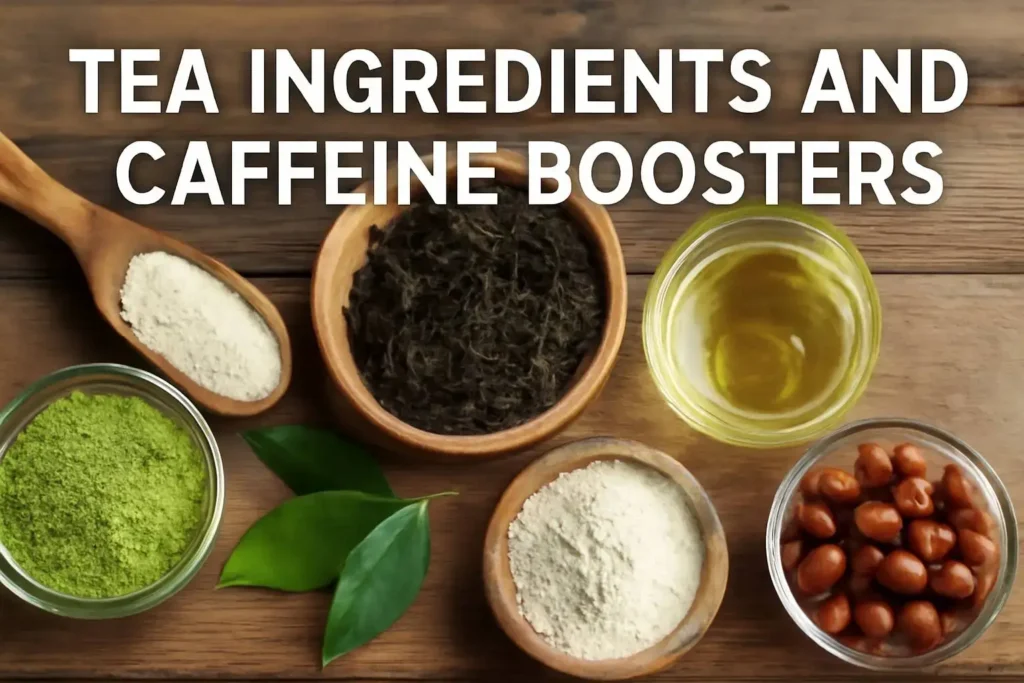
Primary Ingredients:
- Tea concentrate (Normally, extract green tea, powder black tea, oolong tea, white tea extract)
- Caffeine boosters (guarana extract, yerba mate, natural caffeine powder, green coffee bean extract)
- Flavoring agents (artificial flavors, natural flavors, food coloring, flavor enhancers)
- Vitamin supplements (B-complex vitamins, vitamin C, niacin, riboflavin, thiamine)
- Sweeteners (stevia extract, sucralose, monk fruit, aspartame, erythritol)
- Aloe or collagen water (for hydration, skin benefits, digestive health)
- Additional stimulants (taurine, ginseng extract, L-carnitine, green tea catechins)
The combination of these ingredients creates a beverage that can be very high in caffeine, similar to energy drinks, pre-workout formulas, fat burners, and thermogenic supplements, while maintaining a low calorie profile, sugar-free formulation, and keto-friendly macronutrient balance.
How Much Caffeine Is in Popular Loaded Tea Brands?
Herbalife’s Herbal Tea Concentrate and Waka’s Kenyan & Chinese Green Instant Tea are two widely recognized powdered tea options, with 85 mg and 30 mg of caffeine per serving, respectively:
Commercial Loaded Tea Products
Herbalife Herbal Tea Concentrate:
Approximately 85 mg of caffeine per serving when mixed with 6-8 fl. oz. of water. This is one of the most popular base ingredients used in loaded tea recipes.
Ready-to-Drink Loaded Teas:
Can contain anywhere from 100mg to 391mg of caffeine per serving, with some commercial loaded tea products reaching the higher end of this range.
DIY and Nutrition Shop Versions:
Caffeine content can range from 100mg to 391mg per serving, depending on:
- Type and amount of tea concentrate used
- Addition of caffeine boosters like guarana
- Serving size (typically 16-32 oz)
- Number of “scoops” or concentrate servings added
Comparing Loaded Tea Caffeine to Other Beverages
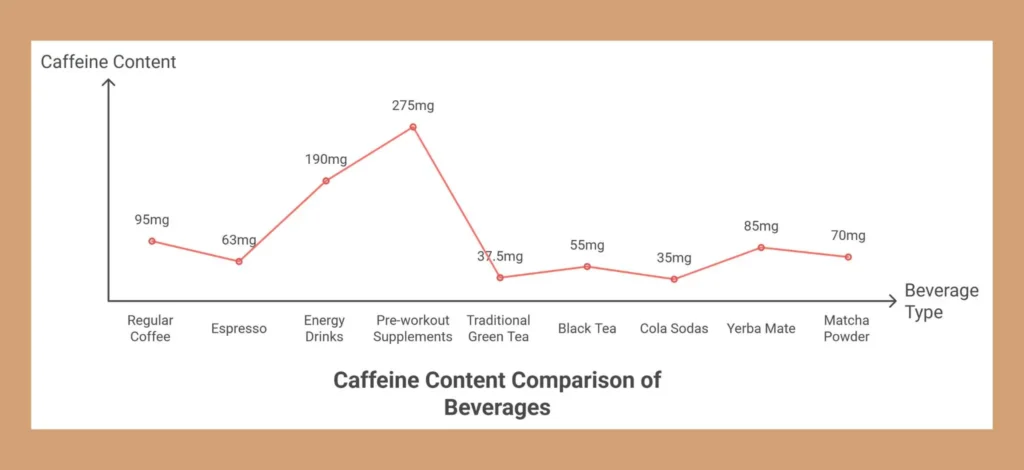
To put these numbers in perspective:
- Regular coffee: 95-100mg per 8 oz cup
- Espresso: 63mg per 1 oz shot
- Energy drinks: 80-300mg per serving (Red Bull, Monster, Bang Energy)
- Pre-workout supplements: 150-400mg per serving
- Traditional green tea: 25-50mg per 8 oz cup
- Black tea: 40-70mg per 8 oz cup
- Cola sodas: Each 12 oz can contains 30-40mg (Coca-Cola, Pepsi)
- Yerba mate: 85mg per 8 oz cup
- Matcha powder: 70mg per teaspoon
This comparison shows that loaded teas fall into the high to extremely high caffeine category, often exceeding coffee and many energy drinks, with some varieties containing nearly 4 times the caffeine of a regular cup of coffee.
What Ingredients Contribute to Caffeine Content?
Understanding the sources of caffeine, natural stimulants, and energy-boosting compounds in loaded teas helps explain why these beverages pack such an energetic punch:
Primary Caffeine Sources
1. Tea Extracts and Herbal Concentrates
The amount of caffeine in loaded teas can differ greatly based on factors such as the brand, formulation, and portion size. Other common tea extracts include oolong tea powder, white tea extract, and pu-erh tea concentrate.
2. Natural Caffeine Powder and Synthetic Caffeine
Many loaded tea recipes include additional natural caffeine powder, anhydrous caffeine, or caffeine citrate to boost energy levels beyond what tea extracts alone provide.
3. Guarana Extract and Seed Powder
This South American plant naturally contains caffeine, theobromine, and theophylline and is often added to loaded tea formulations for sustained energy release, mental alertness, and fat oxidation.
4. Additional Stimulants and Nootropics
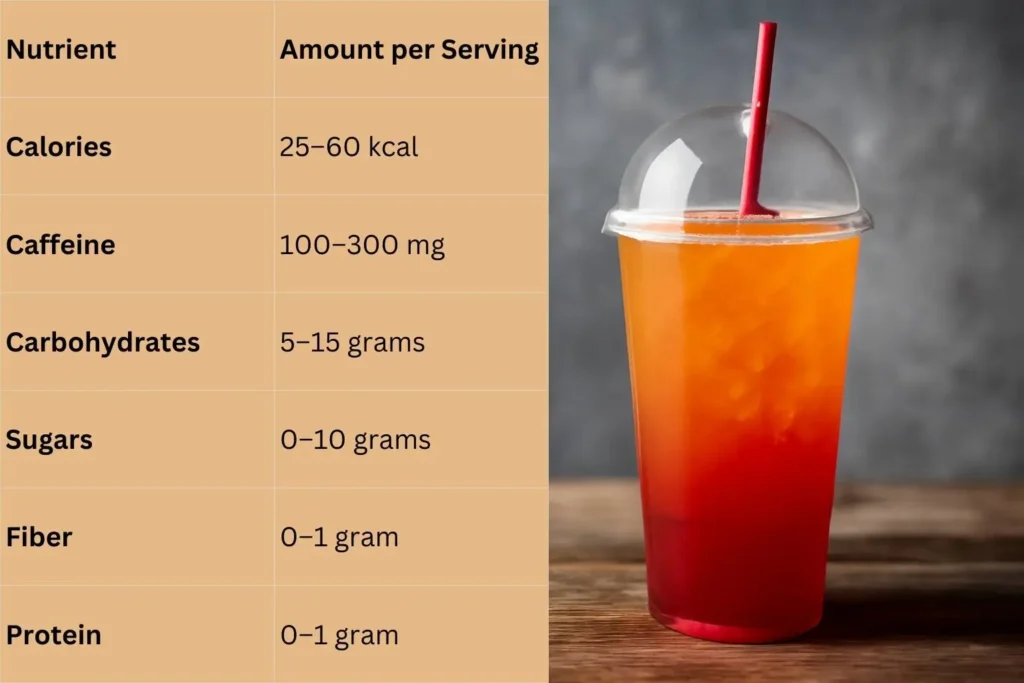
The combination of powdered herbal-tea extracts and a booster yields a concoction similar to energy drinks, pre-workout supplements, and fat burners: caffeine, niacin (vitamin B3), ginseng extract, guarana, taurine, L-theanine, and high doses of vitamins B6, B12, and C for energy metabolism and cognitive function.
Are Loaded Teas Safe? Understanding the Health Implications
While loaded teas market themselves as healthier alternatives to energy drinks, health professionals have raised several concerns about their safety and nutritional value.
Potential Benefits
Low Calorie Content: The average loaded tea provides little nutritional value—approximately 25 calories per 32-oz serving, making them attractive for weight management.
Vitamin Supplementation: Most loaded teas contain added B-vitamins and vitamin C, which can support energy metabolism.
Health Concerns and Risks
High Caffeine Content: You should think of loaded tea along the same lines as an energy drink, versus a true, pure tea. The high caffeine content can lead to:
- Sleep disruption
- Energy crashes
- Increased heart rate
- Anxiety or jitters
Regulatory Issues: These drinks are made with supplements that are not regulated by the Food and Drug Administration (FDA). Any supplement, including loaded tea, carries the potential risk of ingredient contamination and variations in purity.
Recommendations for Safe Consumption: t’s recommended to limit yourself to one serving of loaded tea per day, ideally consumed before the afternoon.
How Do Different Serving Sizes Affect Caffeine Intake?
Understanding serving sizes is crucial for managing caffeine consumption from loaded teas:
Standard Serving Measurements
Small Serving (8-12 oz):
- Caffeine range: 100-150mg
- Equivalent to: 1-1.5 cups of coffee
- Best for: Those new to loaded teas or with moderate caffeine tolerance.
Medium Serving (16-20 oz):
- Caffeine range: 200-250mg
- Equivalent to: 2-2.5 cups of coffee
- Best for: Regular coffee drinkers with higher tolerance
Large Serving (24-32 oz):
- Caffeine range: 300-391mg
- Equivalent to: 3-4 cups of coffee
- Caution: Exceeds recommended daily caffeine limits for most individuals
Tips for Managing Caffeine Intake
- Start small – Begin with half servings to assess tolerance
- Time consumption – Avoid loaded teas after 2 PM to prevent sleep disruption
- Track total intake – Consider caffeine from all sources throughout the day
- Stay hydrated – Caffeine can be dehydrating, so increase water intake
- You can manage your daily caffeine intake with our free caffeine tracker tool.
Making Loaded Teas at Home: Controlling Your Caffeine Content
Making loaded teas at home gives you the flexibility to adjust the ingredients and caffeine content to match your individual preferences and tolerance.
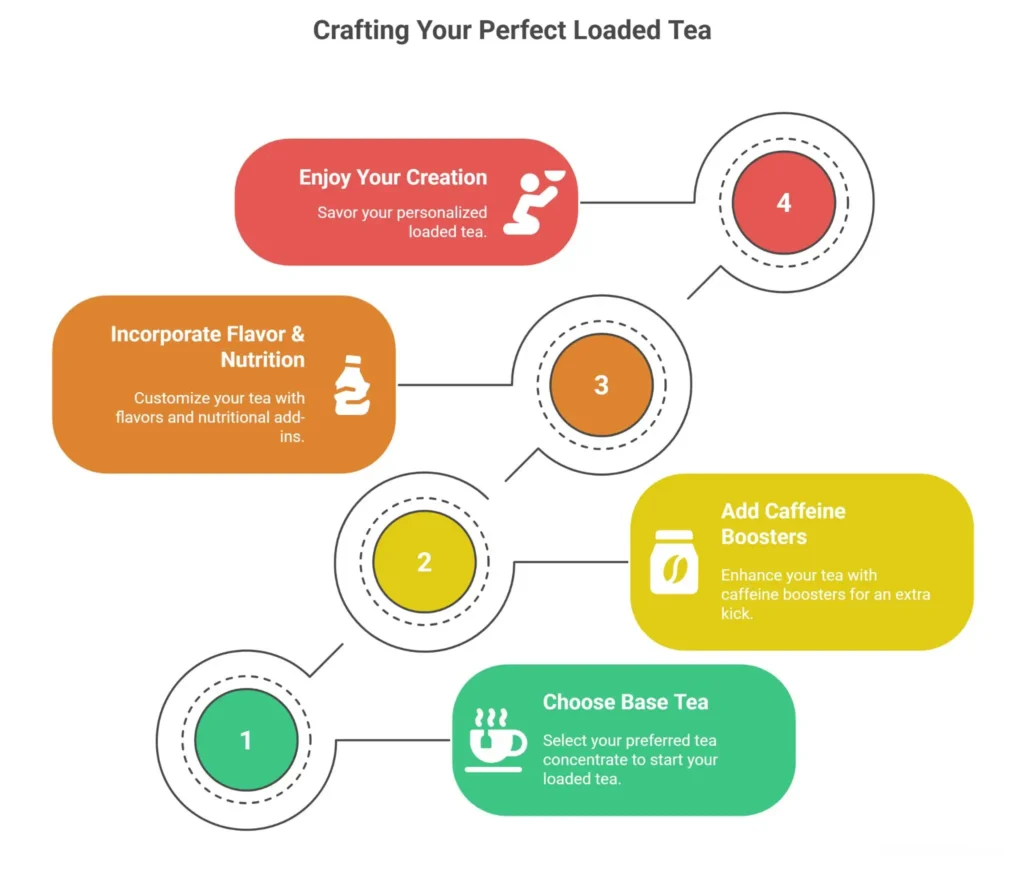
DIY Loaded Tea Recipe Framework
Base Tea Concentrate (choose one):
- Herbalife Tea Concentrate: 85mg caffeine per serving
- Green tea powder: 25-50mg per teaspoon
- Matcha powder: 70mg per teaspoon
Optional Caffeine Boosters:
- Guarana powder: 20-40mg per 1/4 teaspoon
- Natural caffeine powder: Follow package directions
Flavor and Nutrition Add-ins:
- Sugar-free flavoring syrups
- Stevia or monk fruit sweetener
- B-vitamin powder
- Aloe vera juice
- Collagen peptides
Customizing Caffeine Levels
Low Caffeine Version (100-150mg):
- Use minimal tea concentrate
- Skip additional caffeine boosters
- Still higher than regular coffee
Moderate Caffeine Version (200-250mg):
- Standard serving of tea concentrate
- Light guarana addition
- Equivalent to 2+ cups of coffee
High Caffeine Version (300-391mg):
- Multiple tea concentrate servings
- Add guarana and/or caffeine powder
- Only for very high-tolerance individuals
- Approaches dangerous levels for some people
Loaded Tea Alternatives for Different Caffeine Preferences
If loaded teas don’t align with your caffeine needs or health goals, consider these alternatives:
Lower Caffeine Options
Traditional Herbal Teas:
- Chamomile, peppermint, or rooibos (caffeine-free)
- Green tea (25-50mg per cup)
- White tea (15-30mg per cup)
Lightly Caffeinated Beverages:
- Yerba mate (30-50mg per cup)
- Black tea (40-70mg per cup)
- Kombucha (10-25mg per cup)
Higher Caffeine Alternatives
Coffee Variations:
- Cold brew coffee (150-200mg per cup)
- Espresso-based drinks (63-200mg depending on size)
- French press coffee (100-135mg per cup)
Natural Energy Drinks:
- Matcha lattes (70-140mg per serving)
- Guayusa tea (90mg per cup)
- Yerba mate energy drinks (100-150mg per can)
The Social Media Phenomenon: Why Loaded Teas Became Popular
Understanding the cultural context behind loaded teas helps explain their rapid rise to popularity and why caffeine content became a secondary consideration for many consumers.
Marketing and Appeal Factors
Visual Appeal: The vibrant colors and Instagram-worthy presentation made loaded teas perfect for social media sharing, driving viral popularity.
Health Halo Effect: Marketing these beverages as “healthy” alternatives to energy drinks attracted health-conscious consumers, even though caffeine content remained comparable.
Community and DIY Culture: The DIY versions have a similar taste for a fraction of the price, leading to recipe sharing and community building around homemade versions.
Cost Considerations: The $7 to $8 price point per drink led fans of loaded teas to create their own concoctions and post them on social media.
Conclusion
Loaded teas pack a significant caffeine punch, typically containing 100-391mg of caffeine per serving – that’s 1 to 4 times more caffeine than your morning cup of coffee and can compete or exceed the strongest energy drinks in the market. While these colorful, Instagram-worthy beverages offer a low-calorie alternative to traditional energy drinks, it’s essential to approach them with the same caution you’d use with any high-caffeine beverage.
Whether you choose to purchase commercially-made loaded teas or create your own DIY versions at home, understanding the caffeine content helps you make informed decisions about when and how much to consume. Remember that despite their “healthy” marketing, these beverages are essentially caffeinated energy drinks in disguise.
If you’re sensitive to caffeine, pregnant, nursing, or have underlying health conditions, consult with a healthcare provider before incorporating loaded teas into your routine. For everyone else, moderation and timing are key to enjoying these trendy beverages safely while maintaining good sleep hygiene and overall wellness.
Ready to try loaded teas?
Start with a smaller serving to assess your caffeine tolerance, and remember that homemade versions give you the most control over ingredients and caffeine content. Share your loaded tea experiences in the comments below – we’d love to hear about your favorite recipes and how they fit into your daily energy routine!
FAQs
Can you drink loaded tea every day?
Drinking loaded teas every day is not recommended. Their high caffeine content can easily push you over the daily recommended limit of 400 mg, potentially leading to side effects like dependency, anxiety, and sleep issues over time.
Are loaded teas better than energy drinks?
Not necessarily. While loaded teas are often marketed as a “healthier” alternative, they are very similar to energy drinks—they’re both high-stimulant, unregulated supplements. Neither one is a truly healthy choice for daily consumption.
Are loaded teas good for you?
No, loaded teas are not considered good for you. They contain extremely high levels of caffeine and other stimulants, and often include artificial sweeteners and supplements that can be harmful in high doses.
How much caffeine is in Herbalife tea with Liftoff?
A typical Herbalife loaded tea with an Herbalife tea concentrate and a Liftoff tablet contains approximately 200 mg of caffeine. The specific amount can vary based on the exact recipe and the number of supplements used.

